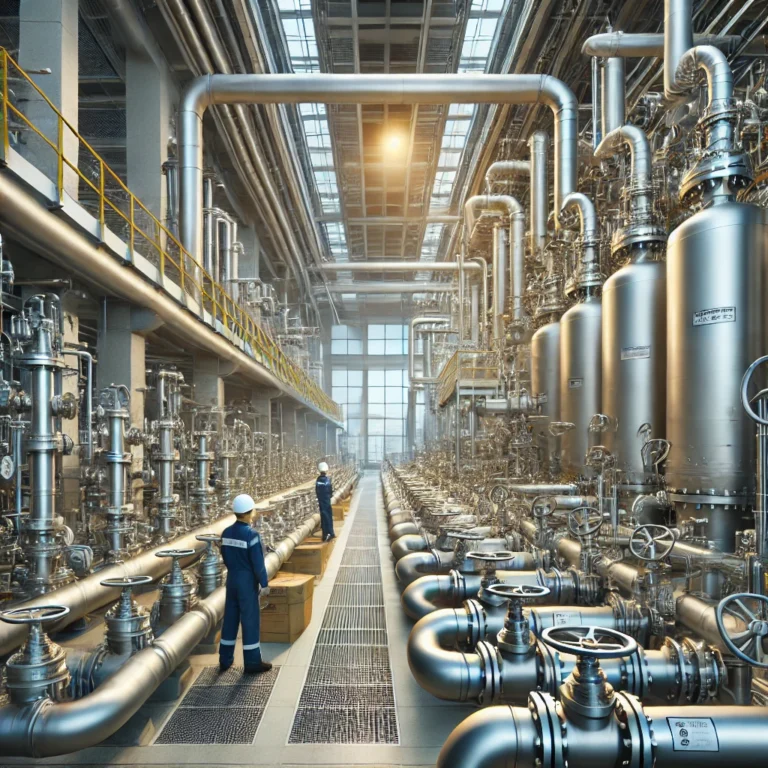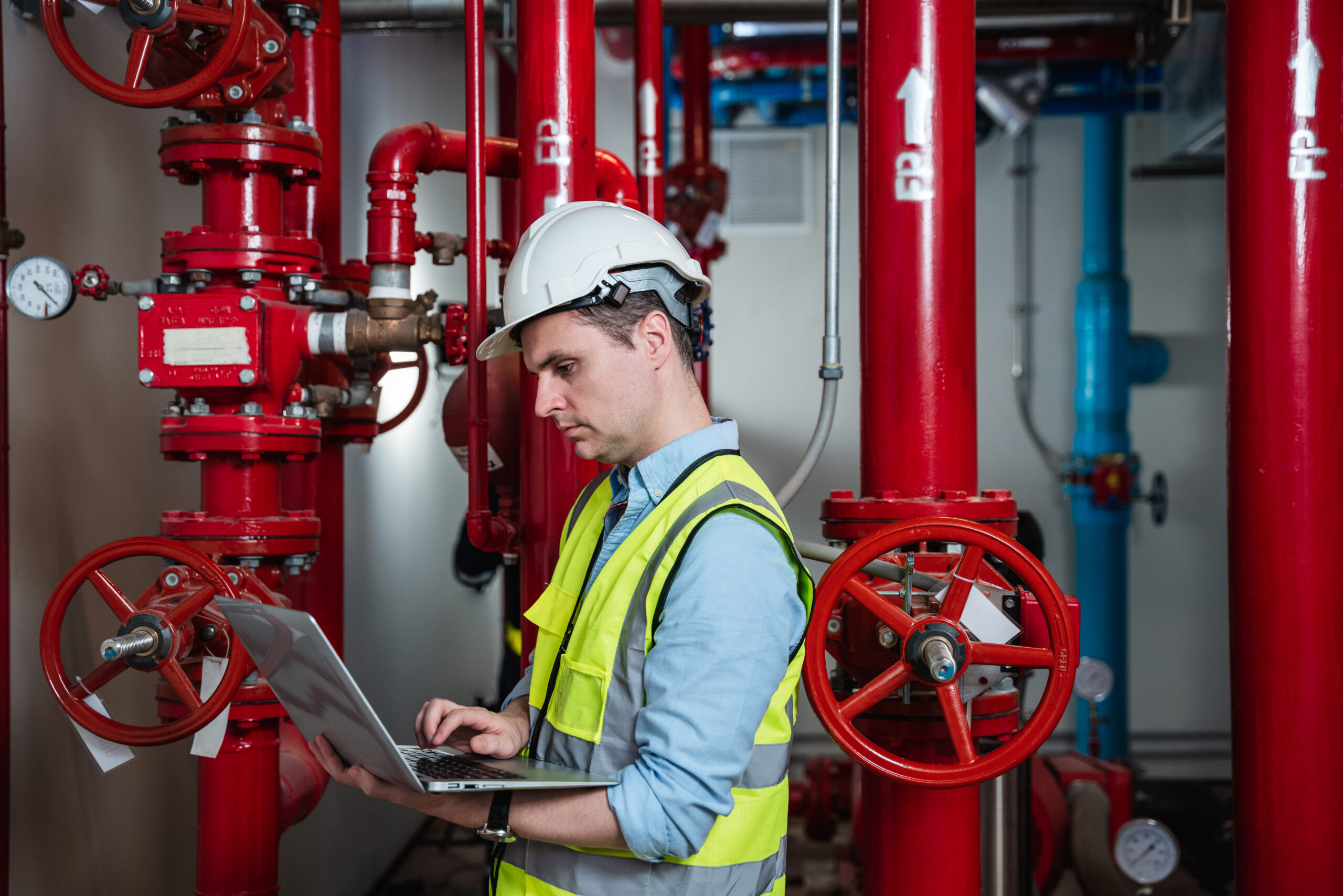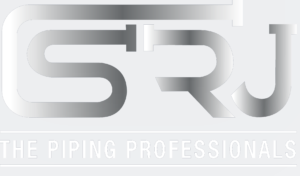The Importance of Regular Maintenance for Industrial Piping Systems
Table of Contents
Think of your industrial piping system as the veins of your facility, distributing life to every corner of your operations. Just as a fit body relies on healthy, functioning veins, your facility depends on a properly maintained piping system to ensure efficiency and safety. Without regular maintenance, neglecting this crucial component can lead to high repair costs, unplanned downtime, or even catastrophic failures.
So, how do you ensure your piping system remains in excellent condition? The key lies in regular maintenance.
In this article, we will explore the importance of regular maintenance for industrial piping systems. Additionally, we will highlight common problems, practical solutions, preventive tips, and provide a fully detailed maintenance checklist. By following this guide, you can maintain your industrial piping system, minimize unexpected problems, and prevent major failures. Let’s get started and make sure your facility’s lifeblood stays in top shape!
Why Regular Piping Maintenance Is Essential
Undoubtedly, regular maintenance of industrial piping systems is not just good practice—it’s essential for longevity and operational efficiency. These systems endure various stresses, such as traction, thermal changes, and exposure to corrosive substances. Over time, these wear and tear factors can lead to failures if not properly managed.
Safety Concerns
A well-maintained piping system not only protects your workforce but also ensures environmental safety. Proper maintenance helps reduce incidents like leaks, bursts, or failures, which could lead to dangerous situations. For instance, even a small leak in a pipe carrying toxic chemicals can escalate into a major safety issue if left unchecked.
Cost Savings
Although maintenance has upfront costs, it ultimately saves money in the long run. Unplanned failures cause production downtime, lost revenue, and expensive repairs. By regularly inspecting and repairing minor issues, you prevent them from becoming larger, costlier problems.
Compliance with Regulations
Furthermore, many industries face strict regulations regarding piping safety and maintenance. Non-compliance can result in fines, litigation, or damage to your company’s reputation. Following a maintenance schedule ensures your piping system meets regulatory standards, keeping you compliant and avoiding penalties.
Environmental Protection
Additionally, leaks or failures in pipes carrying hazardous materials can cause significant environmental damage, especially if toxic substances reach water sources or ecosystems. Regular maintenance helps prevent such incidents by identifying and repairing weak spots before contamination occurs.

Common Piping Issues and How to Address Them
Even with proper maintenance, industrial piping systems may still encounter issues. However, knowing how to handle common problems will keep your system running efficiently.
Corrosion
Corrosion is one of the most damaging issues in industrial piping systems. It occurs when the pipe material reacts with chemicals or moisture, weakening its structure and leading to leaks or failures.
Solutions:
- Routine Inspections: Regularly check for early signs of rust, discoloration, or pitting.
- Protective Coatings: Applying coatings like epoxy or galvanizing prevents direct contact with corrosive substances.
- Material Selection: Use corrosion-resistant materials, such as stainless steel or plastic, where applicable.
Leaks
Leaks can happen due to corrosion, joint failure, or excessive pressure. Even small leaks can lead to significant product loss, increased operating costs, and safety hazards.
Solutions:
- Pressure Monitoring: Continuously monitor system pressure to avoid exceeding safe limits.
- Joint Inspections: Frequently check joints and connections, as they are common points for leaks.
- Leak Detection Systems: Install detection systems that alert you to leaks immediately, allowing for quick repairs.
Blockages
Blockages occur when debris, scale, or other materials accumulate inside the pipes, restricting or stopping fluid flow. This leads to decreased efficiency and increased pressure, which can damage the system.
Solutions:
- Routine Cleaning: Clean pipes regularly using techniques like pigging or hydrojetting.
- Filtration Systems: Install filtration systems to prevent debris from entering the pipes.
- Flow Monitoring: Monitor flow rate for any sudden decreases, which may signal blockages.
Cracking and Fatigue
Pipes endure stresses like pressure changes, temperature fluctuations, and mechanical vibrations, which can lead to cracks and fatigue over time.
Solutions:
- Periodic Inspections: Regularly inspect pipes for early signs of cracking or fatigue.
- Stress Analysis: Identify high-stress sections and reinforce them if necessary.
- Adequate Support: Ensure the system is properly supported to reduce mechanical vibrations and thermal expansion.
Preventive Maintenance Tips
Preventive maintenance is crucial for keeping your industrial piping system in optimal condition. By addressing potential issues before they become critical, you can extend the life of your system and avoid costly repairs.
1. Establish a Maintenance Schedule
A comprehensive maintenance schedule is essential to ensure regular inspections, cleaning, pressure testing, and other tasks are performed on time.
- Frequency: The schedule should account for the system’s age, materials, and operating conditions. Systems handling high-pressure or corrosive materials require more frequent maintenance.
- Record Keeping: Detailed records help track recurring issues and ensure maintenance tasks are completed as scheduled.
2. Conduct Periodic Inspections
Regular inspections are key to identifying early signs of wear, corrosion, or damage.
- Visual Inspections: Examine exposed pipes for leaks, corrosion, or cracks.
- Non-Destructive Testing (NDT): Use techniques like ultrasonic or radiographic testing to detect internal defects without damaging the pipes.
3. Monitor System Performance
Monitoring performance indicators, such as pressure, flow rate, and temperature, is vital for detecting problems early.
- Pressure and Flow Rate: Fluctuations in these values often indicate underlying issues.
- Temperature Monitoring: High temperatures can accelerate corrosion and cause thermal stress, leading to potential damage.
4. Implement Corrosion Control Measures
Corrosion control is a critical component of preventive maintenance. Without proper measures, corrosion can severely weaken the system.
- Coatings and Linings: Apply protective coatings inside and outside the pipes to prevent contact with corrosive substances.
- Cathodic Protection: Use systems like sacrificial anodes to counteract corrosion.
5. Train Your Maintenance Team
A well-trained maintenance team is essential for effective preventive care. Proper training ensures that your team can identify and address issues promptly.
- Ongoing Training: Offer regular training on the latest maintenance techniques and safety procedures.
- Cross-Training: Train multiple team members to handle different components of the system, ensuring continuity even when key personnel are unavailable.
6. Replace Worn Components Before They Fail
Replacing worn components, such as gaskets, seals, and joints, before they fail helps avoid unexpected breakdowns.
- Schedule Replacements: Replace parts based on their expected lifespan.
- Inventory Control: Keep a stock of critical spare parts to minimize downtime during replacements.
7. Implement a Leak Detection Program
Leaks can be a major issue in industrial piping systems. A leak detection program can help prevent minor leaks from becoming serious problems.
- Automatic Detection Systems: Install real-time leak detection systems to catch leaks early.
- Routine Leak Checks: Conduct manual leak checks during regular maintenance to ensure nothing is missed.

Piping Maintenance Checklist
Here’s a sample checklist to help you maintain your industrial piping system:
Weekly
- Inspect exposed pipes for leaks or corrosion.
- Check pressure and flow rates for unusual fluctuations.
- Verify all valves are functioning properly.
Monthly
- Inspect insulation and protective coatings.
- Clean fluid filters and strainers.
- Test pressure relief valves for proper function.
Quarterly
- Perform non-destructive testing to detect internal corrosion or cracks.
- Inspect and tighten mechanical joints and seals.
- Lubricate valve mechanisms and moving parts.
Every Six Months
- Conduct pressure testing to check for leaks.
- Maintain cathodic protection systems.
- Clean the system to remove debris or scale.
Annually
- Replace worn seals, gaskets, and other components.
- Perform a full system audit to assess overall condition.
- Update maintenance records and resolve recurring issues.
By following this checklist, you can ensure that your industrial piping system remains reliable and efficient. Adjust the checklist as necessary to fit the specific needs of your facility.
Conclusion
Maintaining an industrial piping system requires ongoing attention to ensure safety, reliability, and efficiency. By understanding the importance of regular maintenance, addressing common issues, and implementing preventive measures, you can avoid costly downtime and extend the life of your system.
At SRJ Piping India Pvt Ltd, we are committed to helping you maintain your industrial piping system with expert guidance and comprehensive solutions. Let us help you keep your facility running smoothly and efficiently.
Your piping maintenance checklist isn’t paperwork—it’s the only barrier between routine inspections and ₹22Cr catastrophe. The API 570 Piping Inspection Code reveals 68% of failures stem from skipped basic checks—gaps our ISO 17020-Certified Team eliminates through this battle-tested checklist. When a Gujarat refinery ignored these 7 critical items, the result was a ₹184Cr shutdown (per PNGRB Incident Report):
Corrosion Under Insulation (CUI)
Pulsed eddy current scans every 90 days (per ASME B31.3)
Thermal imaging for wet insulation detection
Small Bore Piping Vulnerabilities
200% more vibration failures than main lines
Our Robotic CRAWLER-SCAN™ covers 98% of hidden joints
Support Integrity
Spring hanger calibration drift >5% demands replacement
Pipe shoe corrosion mapping
Wall Thickness Erosion
Ultrasonic testing at 3D bends and tees
AI-powered remaining life prediction
Flange Management
Bolt torque verification with ultrasonic tension meters
Gasket condition grading system
Dead Leg Risks
Stagnant fluid microbiological testing
Targeted chemical injection points
Safety Relief Valves
10% overpressure testing
Bellows integrity checks
This isn’t maintenance—it’s failure forensics stopping disasters before they strike.
Need a Reliable Maintenance Partner?
SRJ Piping India provides comprehensive maintenance programs to extend the life and efficiency of your industrial piping systems.
